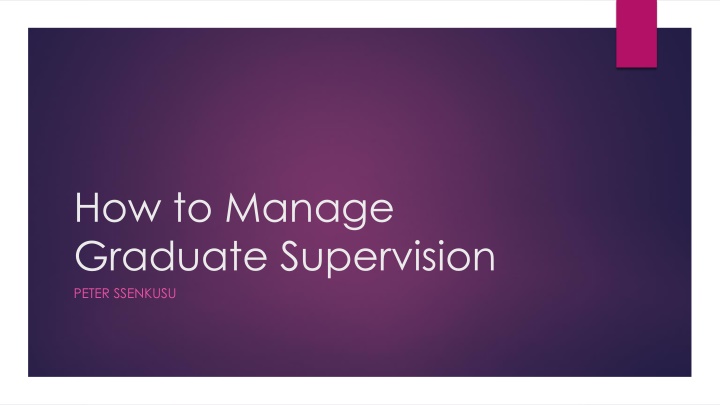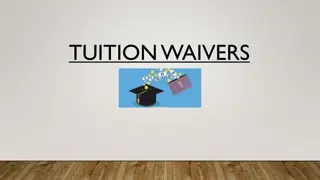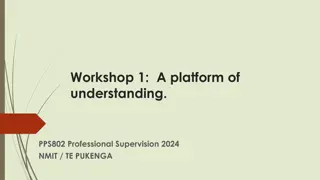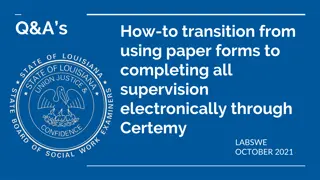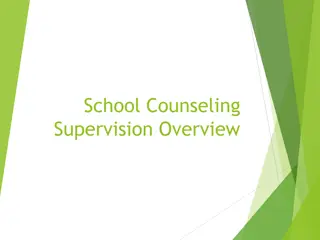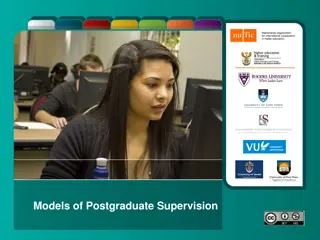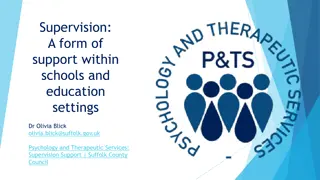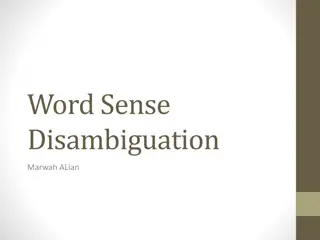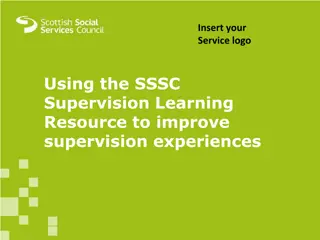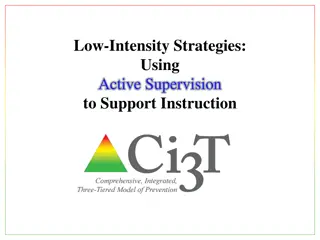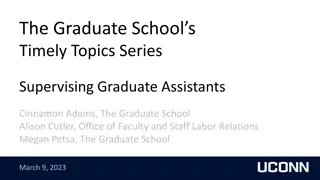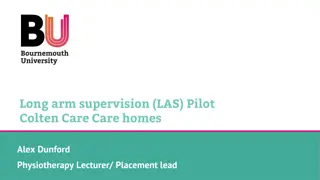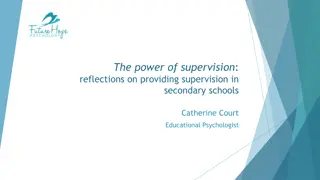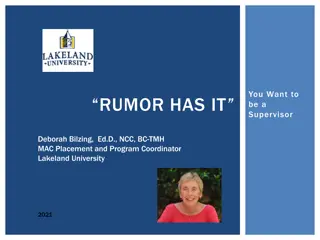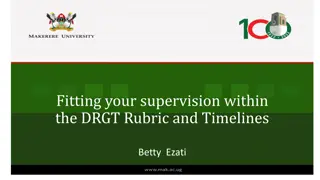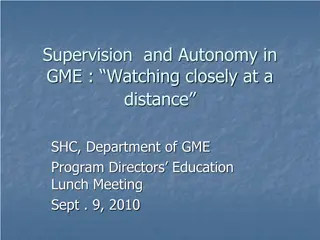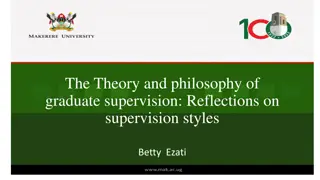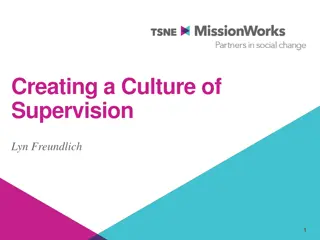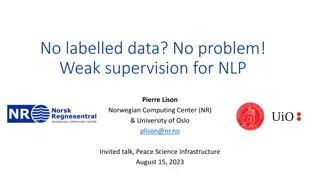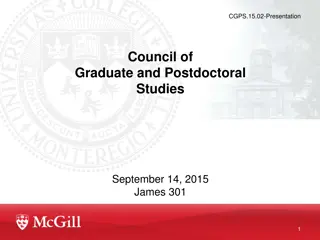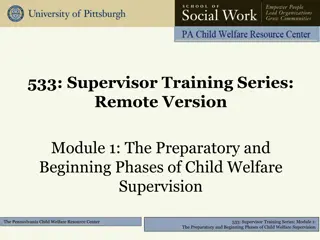Managing Graduate Supervision: Strategies and Approaches" (77 characters)
This content explores the strategies and approaches for managing graduate supervision, focusing on different frameworks and techniques used by supervisors. Topics include distinguishing between Techne & Phronesis, the five steps of supervision, and the roles of Platonic and Aristotelian supervisors in the process. It delves into the character and progression of supervision, emphasizing negotiation and guidance for supervisees in their academic journey.
Download Presentation

Please find below an Image/Link to download the presentation.
The content on the website is provided AS IS for your information and personal use only. It may not be sold, licensed, or shared on other websites without obtaining consent from the author.If you encounter any issues during the download, it is possible that the publisher has removed the file from their server.
You are allowed to download the files provided on this website for personal or commercial use, subject to the condition that they are used lawfully. All files are the property of their respective owners.
The content on the website is provided AS IS for your information and personal use only. It may not be sold, licensed, or shared on other websites without obtaining consent from the author.
E N D
Presentation Transcript
How to Manage Graduate Supervision PETER SSENKUSU
Session introduction Is based on the framework by Anne Lee (2008): How are doctoral students supervised? Concepts of doctoral research supervision The framework is a combination of literature and interviews that integrate theory and practice The supervisors were asked to describe what they actually did in their meetings, what they expected students to do, what problems arose and how they were coped with, occupationally what their students have subsequently gone on to do. what their objectives were and
Session outcomes By the end of the session, participants should be able to Distinguish between Techne & Phronesis in supervision Identify the five steps of managing graduate supervision Describe how each of the approaches plays out itself in them supervision experience Analyse some of the tensions that supervisors try to reconcile
5 Steps to managing supervision Functional role: Structuring the process 1. Enculturation: Guiding the supervisees to become members of the disciplinary community 2. Critical Thinking: Supporting the supervisee to analyse their work 3. Emancipation: Encouraging the supervisees to question and develop themselves Developing relationships: Getting supervisees enthused, inspired & cared for 4. 5.
Managing Supervision as Techne Supervisor as a Platonic Kingly Techne Treats supervisees as metal to be formed & controlled towards predictable ends Streamlines the basic rules of procedure Gives direct instruction
Managing Supervision as Aristotelian Phronesis Supervision is guided by achieving an understanding Weighs the research traditions and customs against the supervisee s unique circumstances Endevours to make a good judgement about how research norms can be applied to daily decisions
Platonic Supervisor (Techne) Knowledge determines the character of supervision Aristotelian Supervisor (Phronesis) Having knowledge is not enough but acting on it Character of supervision is determined and progressive Character of supervision is negotiated Focuses on the provision of physical things, instructions, required materials Draws from both physical resources and inner resources of the supervisee Associated with efficiency / correctness Associated with effectively dealing with uncertain human behaviours, beliefs & events A technician/technetes imposes an external efficient cause, e.g. wood will never on its own accord a shape of a chair without a carpenter Activates an internal efficient cause. i.e. members can change themselves willingly into good people provided that they are placed in the proper environment
Functional role: Structuring the process Professional role of the supervisor technical rational role Supervisor is a director and manager Focuses on giving practical advices, agreeing on the ground rules, introducing supervisee to new colleagues, project expectations, study plans, ethical issues
Enculturation: Guiding the supervisees to become members of the disciplinary community Supervisee is an apprenticeship learning after the skilled craft man / woman Supervisor is like a family doctor provides specific expertise Orientation to institutions, the community and the discipline- the 3 layers Is a gatekeeper to learning resources, specialist opinions and networks Social dimensions of research / cultural context of the field in which the research is taken
Enculturation: Guiding the supervisees to model the way Decides which gates to open, especially in the early states of the researcher s life Gradually the supervisee is given legitimate peripheral participation Wielders a great amount of power Both the supervisor and the supervisee are visible & present
Critical Thinking: Supporting the supervisee to challenge the process Is at the heart of graduate education and research b) What are the arguments for and against? Enables supervisee to apply rational criterial to the reasoning of speakers and writers c) What has been considered and what has been left out d) What are the gaps in knowledge? Aids the supervisee to address questions like: a) What is the underlying conceptual framework?
Critical Thinking: Supporting the supervisee to challenge the process Critical thinking role involves the Socratic Inquiry the supervisor guides the supervisee to cleverly question and cross-examine, peeling away layers of half-truths, exposing hidden assumptions to gradually accepting that there is no one right answer
Emancipation: Enable the supervisees to act and develop themselves Supervisor play a facilitative process requiring support and challenge Supervisor recedes in the background as supervisee takes the centre stage Gives educational tasks Supervisor is guided by belief in the self experience and self discovery of the supervisee Supports the progressing of the candidature Mentors and coaches Sponsors supervisee in academic practice
Relationship development role- inspire a shared vision Supervisor uses emotional intelligence and flexibility to steer the research project Friendship can get in the way of a good supervisory relationship because it might blunt the ability to be critical Interruptions and dissatisfactions derail the process But close contact is inescapable Relationship includes a desire to enthuse, encourage, recognise achievement and offer pastoral support BUT good relationships do not necessarily imply friendship at the beginning
Enculturational roles Critical Thinking roles Functional roles Emancipational roles Relational roles
